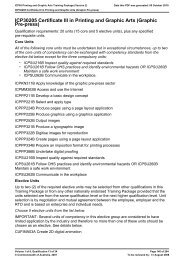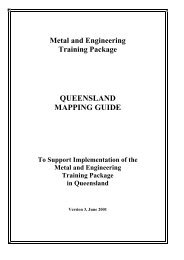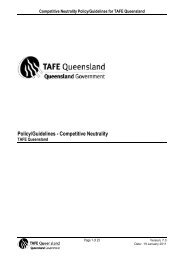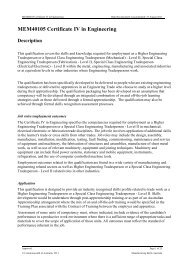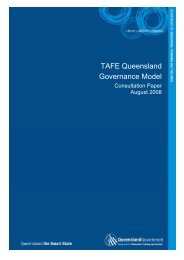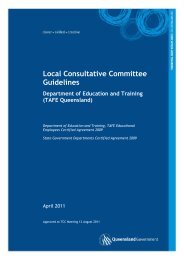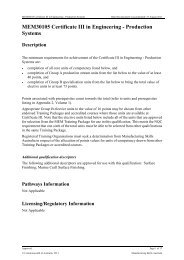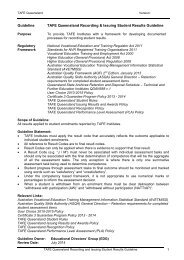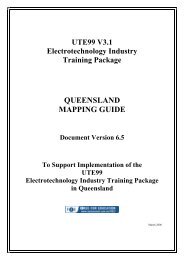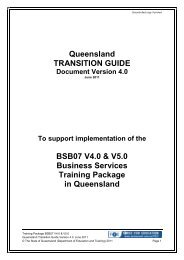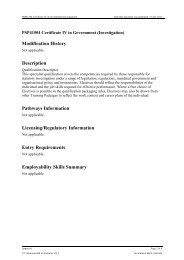The Crux of the Matter - Training Queensland - Queensland ...
The Crux of the Matter - Training Queensland - Queensland ...
The Crux of the Matter - Training Queensland - Queensland ...
Create successful ePaper yourself
Turn your PDF publications into a flip-book with our unique Google optimized e-Paper software.
What is language, literacy<br />
and numeracy<br />
In order to successfully address LLN issues it is<br />
important that everyone has a sense <strong>of</strong> what <strong>the</strong>se<br />
skills are.<br />
Language<br />
Language is <strong>the</strong> main way we make and understand<br />
meaning as humans.<br />
When we talk about language we are talking about<br />
speaking, listening, reading, writing and visual<br />
communication 1 . In its broadest sense, language<br />
involves <strong>the</strong> words, verbal structures and gestures<br />
we use to convey meaning. We are also talking<br />
about using words and grammatical structures and<br />
o<strong>the</strong>r meaning support systems (e.g. gestures when<br />
speaking and listening; punctuation and formatting<br />
when reading and writing) to make meaning <strong>of</strong>, or to<br />
understand somebody else’s meaning.<br />
Language is more than a matter <strong>of</strong> knowing words<br />
and using correct grammar though. Knowing <strong>the</strong> way<br />
language is used by specific social groups – at work<br />
or in <strong>the</strong> general community – gives us access to<br />
<strong>the</strong>se groups and <strong>the</strong>reby enables us to achieve our<br />
personal, work and social goals.<br />
Our workplaces <strong>of</strong>ten involve a mix <strong>of</strong> language<br />
groups. Sometimes workers can hold technical<br />
competency without English language competency.<br />
Language can also refer to individual languages<br />
such as English, Mandarin or Dyirbal.<br />
Language changes over time and context. Industries<br />
have <strong>the</strong>ir own vocabulary including jargon,<br />
technical terms and acronyms that workers must<br />
understand. This can be very challenging for some<br />
people, particularly those for whom English is<br />
not <strong>the</strong>ir first language. Take <strong>the</strong> word ‘cookie’ for<br />
example. A baker may bake it, a photographer may<br />
attach it to a light stand and an IT technician may<br />
stop it being transmitted over <strong>the</strong> internet.<br />
Effective cross-cultural communication requires a<br />
range <strong>of</strong> skills including <strong>the</strong> ability to appreciate<br />
that <strong>the</strong>re may be variations in <strong>the</strong> value placed<br />
on <strong>the</strong> communication forms <strong>of</strong> language. For<br />
example, while written language is highly regarded<br />
in <strong>the</strong> English language, Australian Indigenous<br />
languages place higher value on verbal and visual<br />
communication forms.<br />
Literacy<br />
Literacy is <strong>the</strong> ability to read and use written<br />
information as well as to write in an appropriate<br />
manner at home, at work and in <strong>the</strong> community.<br />
Literacy is <strong>the</strong> ability to read and use written<br />
information as well as to write in a range <strong>of</strong> contexts.<br />
Literacy involves <strong>the</strong> integration <strong>of</strong> speaking,<br />
listening and critical thinking with reading and<br />
writing.<br />
Literacy is purposeful. Our literacy skills enable us<br />
to interact with one ano<strong>the</strong>r to achieve particular<br />
purposes: to explain, debate, retrieve and provide<br />
information, explore issues, entertain and create.<br />
Literacy is more than basic reading and writing<br />
(sometimes called functional literacy) such as<br />
following instructions, filling in forms, reading<br />
bus timetables and writing a note to a household<br />
member. It is also a process <strong>of</strong> using higher order<br />
reading and thinking skills to question what we see<br />
in written texts (sometimes called critical literacy).<br />
Literacy is also about our social application <strong>of</strong><br />
language, for example in our homes, communities,<br />
schools and workplaces. Like language, literacy<br />
practices change over time and with social and<br />
cultural contexts. We have seen this over <strong>the</strong> last<br />
decade with emerging multi-media and information<br />
technologies and our multicultural society.<br />
<strong>The</strong> literacy demands placed on individuals also<br />
change throughout <strong>the</strong>ir lifetimes. As we experience<br />
new situations we need to continually adapt and<br />
extend our literacy skills.<br />
1 Visual communication skills underpin <strong>the</strong> agreed language <strong>of</strong> <strong>the</strong><br />
Australian Deaf community, Australian Sign Language (Auslan).<br />
10 <strong>The</strong> <strong>Crux</strong> <strong>of</strong> <strong>the</strong> <strong>Matter</strong> - Language, Literacy and Numeracy and Vocational Education and <strong>Training</strong>





